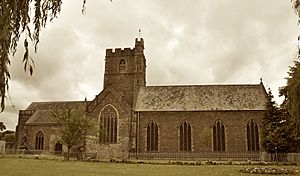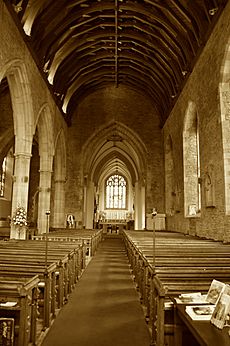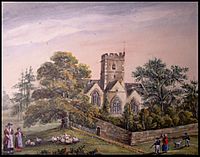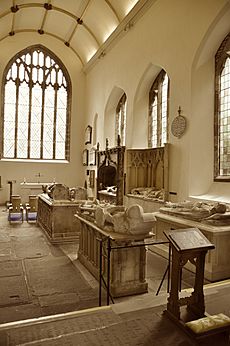Priory Church of St Mary, Abergavenny facts for kids
Quick facts for kids Priory Church of St Mary |
|
|---|---|

Priory Church of St Mary
|
|
| 51°49′17″N 3°00′55″W / 51.8214°N 3.0154°W | |
| Location | Abergavenny, Monmouthshire |
| Country | Wales |
| Denomination | Church in Wales |
| History | |
| Status | Parish church |
| Founder(s) | Hamelin de Ballon |
| Architecture | |
| Functional status | Active |
| Heritage designation | Grade I |
| Designated | 11 July 1952 |
| Administration | |
| Parish | Abergavenny |
| Deanery | Abergavenny |
| Archdeaconry | Monmouth |
| Diocese | Diocese of Monmouth |
| Province | Wales |
The Priory Church of St Mary is a very old church in the middle of Abergavenny, Wales. It is sometimes called "the Westminster Abbey of Wales". This is because it is very large. It also has many important tomb monuments and effigies (statues of people) inside. The church became a special Grade I listed building on July 1, 1952. This means it is a very important historic building.
Contents
History of the Priory Church
The current church building was started around 1070 by the Normans. But before that, there was likely an even older structure on the same spot. This could have been from the Iron Age or Roman times. Archaeologists have found old Roman pottery there. There was also a church called "The church of the Holy Rood" in the town, but we don't know exactly where it was.
The church you see today was first part of a Benedictine Priory. A priory is like a monastery. It was set up by Hamelin de Balun, the first Norman ruler of Abergavenny, in the 1090s. At first, it was connected to a larger abbey in France. Important people like Henry de Abergavenny were leaders here. He even helped at the crowning of King John I of England in 1199.
Over time, the Lords of Abergavenny helped the Priory with money and gifts. In 1320, a Lord named John Hastings, 2nd Baron Hastings asked the Pope to investigate the Priory. The monks were accused of not following their rules. The leader, Fulk Gaston, even ran away with the church's silver!
When King Henry VIII closed many monasteries in the 1530s, this Priory was saved. This was because the Lords of Abergavenny were close to the Tudor dynasty royal family. So, the Priory Church became the main church for the local area.
What the Church Looks Like
The church is shaped like a cross and is very big. The main part and the area near the altar are about 52 meters long. The central tower has ten bells.
The church mostly shows styles from the Decorated and Perpendicular Period of architecture. Like many old churches, it was updated in the 1800s during the Victorian era. Sadly, not much of the original Norman architecture is left. However, a Norman baptismal font (a basin for baptisms) was found in the churchyard in the 1800s. It had been removed long ago because a local minister didn't believe in baptizing babies.
Some parts of the church are still very old. The wooden choir stalls (seats for the choir) are from the 1400s. They have cool carvings called misericords. These stalls even have the name of the leader at that time, Wynchestre. His special seat is still there, a bit higher than the others.
Amazing Statues (Effigies)
The church has a fantastic collection of memorial effigies. These are statues of people who have passed away. The effigies are made from wood, alabaster, and marble. They date from the 1200s to the 1600s.
One effigy shows John de Hastings, 2nd Baron Hastings, who died in 1324. He looks like a young knight wearing armor.
Lewis Chapel (or Joseph Chapel)
This chapel is named after Dr David Lewis, an important person from Jesus College, Oxford. His tomb is here.
In this chapel, there are two statues of women. One holds a heart in her hand. This might mean that only her heart was buried there. This statue is from the late 1200s and is thought to be Eva de Braose. It's unusual because she has a shield with the Cantilupe family's symbol.
The other female statue is from the 1300s. People say it's a member of the Hastings family. The story goes that she died chasing her pet red squirrel along the walls of Abergavenny Castle. The statue used to have a small chain around her waist, which was attached to a squirrel. But the squirrel part is now gone.
In November 2017, this chapel was dedicated to Saint Joseph.
Herbert Chapel (or Benedict Chapel)
The Herbert Chapel has many statues and tombs of the Herbert family. These include Sir Richard Herbert, who died in 1469. His brother, William, Earl of Pembroke, also has a monument here. William's son, Richard Herbert of Ewyas, was raised with Henry Tudor (who later became King Henry VII). Richard fought alongside Henry at the Battle of Bosworth Field in 1485.
This chapel also has special brass plaques from the 1500s and 1600s. In 2018, the chapel was dedicated to St Benedict. The monks of the Priory followed St Benedict's rules.
Important People Buried Here
Many notable people are buried in the Priory Church, including:
- William ap Thomas and his wife Gwladys ferch Dafydd Gam
- John Hastings, 2nd Baron Hastings
- Laurence Hastings, 1st Earl of Pembroke
- Richard Herbert of Coldbrook and his wife Margaret Verch Thomas
- Sir Richard Herbert (who died in 1510)
The Jesse Carving
The Jesse is a very detailed and large wooden carving from the 1400s. It was once part of an even bigger carving called a Jesse Tree. This tree showed the family history of Jesus Christ, as told in the Bible.
This carving is unique in Britain. Experts like Tate Britain say it's one of the best medieval sculptures in the world. Art historian Andrew Graham-Dixon called it the only "unarguably great wooden figure" left from the Middle Ages.
In 2016, a new stained-glass Jesse window was put in the Lewis Chapel. The wooden Jesse carving is now placed at the bottom of this new window. Important people, including Charles, Prince of Wales, visited and dedicated this amazing artwork in July 2016.
The Organ
Around 1830, an old organ from Bristol was brought to the church. It was later moved and made bigger in 1883. The organ was used for many years.
However, in 1998, the floor under the organ sank. The organ had to be taken apart and moved. Sadly, the place where it was stored leaked, and the wooden parts of the organ rotted away. Because it was too expensive to replace, the church decided to get a digital organ instead. A smaller pipe organ from another church has been used for smaller services since 2015.
Organists of the Church
Many talented musicians have played the organ at the Priory Church:
- Edward Howells, 1830–1855
- Francis Marshall Ward, 1855–1857
- Ernest Thomas Bennett Gilbert, 1857–1859
- Jonathan Macrone, 1859–1860 (and again in 1861)
- Mr. Crown, 1860–1861
- Mr. Doorly, 1861–????
- Charles Isaac Howells ???? – 1883
- Thomas Throne Crick Biggs, 1883–1894
- William Robert Carr, 1894–1933
- J. E. Hughes 1933–????
- Graham Elliott
- John Eden, 1994–2002
- Tim Pratt, 2001–present
The Church Bells
When the local people took over the church around 1536–39, they bought the four existing bells. Three of these bells were remade in the 1600s and early 1700s.
More bells were added over time. In 1835, the church had five bells, and by 1845, it had six. To celebrate Queen Victoria's Golden Jubilee in 1887, the bells were rehung and increased to eight.
In 1947, all the bells were remade by a company called John Taylor & Co. The number of bells was also increased to 10. The largest bell now weighs about 1,270 kilograms.
The Church Today
The old Tithe Barn near the Priory was opened by Charles, Prince of Wales in October 2008. Inside, there is a huge 7.3-meter tapestry. This tapestry shows the history of Abergavenny and was made by volunteers for the year 2000. The barn is now the Priory's Heritage Centre. It offers information to the public and visitors.
After many years, the vicar, Jeremy Winston, became the Dean of Monmouth. In January 2012, Fr Mark Soady became the new vicar. He was also made Prior in September 2014. Fr Mark left the Priory in March 2020.
In September 2014, a new group of monks, called the Holywell Community, was started. This happened after nearly 500 years without a monastic community there.
Gallery








